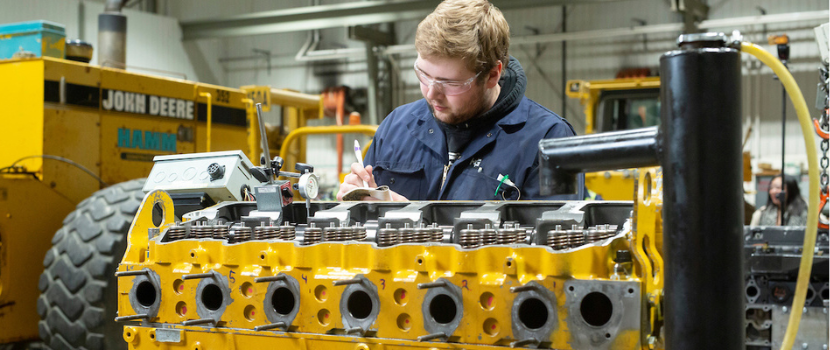
Maximize your career opportunities with the Heavy Equipment and Truck and Transport applied certificate program – you’ll get training in two high-demand trades at once. Heavy Equipment and Truck and Transport grads are in high demand, with opportunities in urban, rural and remote areas. Boost your earning power and job opportunities even more by pursuing journeyperson’s certification.
Start date
No applied certificate courses currently scheduled
Length
19 weeks
Location(s)
SaskatoonThe 19-week program is all about practical learning. In addition to classroom learning, you’ll get hands-on learning by working on different types of equipment. On the heavy duty equipment side, you could work on bulldozers, cranes, graders, loaders or earthmovers. On the truck and transport side, you could work on trucks, buses or highway transport vehicles.
The Heavy Equipment and Truck and Transport applied certificate program is also delivered off-campus at regional colleges and through Skills Training programming.

Trade to degree
Career and salary information
Your career
Successful completion of the Heavy Equipment and Truck and Transport applied certificate opens a lot of doors. Look for entry-level jobs with equipment dealerships or with companies in the construction, oil and gas, forestry, mining and transportation sectors.
Part-time delivery
To register for individual courses, please view the part-time offerings available in the Courses section below.Admissions
Admission requirements
- Grade 11 with one of the following mathematics: Foundations of Math 20, Pre-Calculus 20, Workplace and Apprenticeship Math 20 (Modified and General Math credits are not acceptable)
- English Language Requirement
Alternative admission
Applicants who do not possess the academic qualifications for a program may be admitted if evidence of probable success can be established through an alternative admission assessment. Applicants are automatically considered for alternative admission. However, some specific admission requirements may still need to be met.
ACCUPLACER©
Refer to the ACCUPLACER© cut scores for this program below, and review additional details concerning Alternative Admission using Accuplacer.
- 250 Arithmetic
- 243 Reading
- 241 Writing
Post-secondary
Some programs allow applicants to meet the admission grade level requirement using 15 approved post-secondary credits. Review additional information.
Admission method
First Qualified/First Admitted
The First Qualified/First Admitted (FQFA) process is used for the majority of Saskatchewan Polytechnic programs. When we determine that you meet the program's admission requirements, you will be offered admission based on the date you fully qualify for the program. The earlier you provide the appropriate documents and information that qualify you for admission to the next intake, the earlier you might begin your studies.
Applications for all FQFA programs open September 1 each year.
Sponsored programs or programs targeted to specific groups do not accept applications year round or maintain an application pool.
See Admission Processes for more information about this method of admission.
Tuition and fees
Estimates are based on current rates and are subject to change. Amounts for a program may vary by campus. Totals shown here include all mandatory fees as well as approximate cost for books and supplies. Visit the Tuition and Fees web page for a complete breakdown of tuition and fees for this program.
2025-26 academic year
To be determined
Courses
Get credit for what you know
Prior Learning Assessment and Recognition
Saskatchewan Polytechnic recognizes that adults learn in many different ways. This includes acquiring knowledge and skills through life and work experience or non-formal training.
See link(s) below to get more information about PLAR.
Transfer credit
Many Sask Polytech students benefit from transferring course credit. You may be eligible to transfer credit to Sask Polytech or to another college or university.
Transfer credit options vary over time; this information is subject to change. Transfer credit options for this program include:
- credit is granted for COMM 127 (Industrial Communications) and MATH 125 (Industrial Mathematics) in other Saskatchewan Polytechnic industrial/trades programs
- credit is granted for the following Saskatchewan Polytechnic certificate-level Heavy Equipment and Truck and Transport Technician courses: COMM 127 (Industrial Communications), DRTR 170 (Bearings, Seals, Clutches and Transmissions), DRTR 171 (Differentials and Final Drives), ELEC 171 (Fundamentals of Electricity), ELEC 172 (Starting and Charging Circuits) and MATH 125 (Industrial Mathematics).
Student awards
Thanks to the generosity of donors and alumni, Saskatchewan Polytechnic gives away more than $2 million in student awards during the academic year.
Saskatchewan Polytechnic offers student awards for every certificate and diploma program at every campus. Not all student awards are based on marks - some are based on financial need or things like community or volunteer involvement.
Additional information
Have a question? Email ConEd@saskpolytech.ca or call 306-659-4418.

